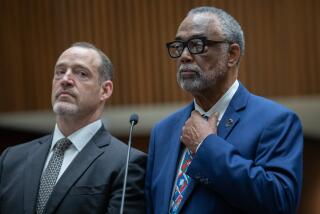Pierce Invokes 5th, Says Probers Prejudged Him
- Share via
WASHINGTON — In an action without precedent since the Teapot Dome scandal, former Housing Secretary Samuel R. Pierce Jr. Tuesday invoked the Fifth Amendment right against self-incrimination, refusing to testify about political favoritism during his eight-year tenure.
Pierce, appearing under subpoena, accused the House Government Operations employment and housing subcommittee of prejudging him and not allowing him enough time to prepare testimony about charges of influence-peddling, mismanagement and waste while he was the top official at the Department of Housing and Urban Development.
“The subcommittee’s desire to rush me through this process . . . leads me to the painful conclusion that I have been prejudged by this body,” said Pierce, 67, the only black member of former President Ronald Reagan’s Cabinet.
Rep. Tom Lantos (D-San Mateo), chairman of the panel, rejected the allegations of bias and said that Pierce is only the third Cabinet member in U.S. history to invoke the Fifth Amendment before a congressional panel. The last instance involved the Teapot Dome inquiry into improper disposition of naval oil reserves in the 1920s. In that case, Secretary of the Interior Albert B. Fall was sentenced to prison for accepting bribes.
Pierce, living up to the “Silent Sam” nickname that reflected his low-profile Cabinet style, spent less than 45 minutes in the witness chair.
To each of eight questions posed by Lantos, the former prosecutor and New York city judge answered: “On the advice of counsel and for the reasons given in my opening statement, I respectfully decline to answer the question and I assert the rights guaranteed me by the Fifth Amendment.”
In a brief opening statement, however, Pierce held out the possibility that he might change his mind and testify on the scandals exposed by the House investigation since it began hearings into affairs of his department last May. He remains under subpoena for appearances on Oct. 27 and Nov. 3.
Some members of Congress said that they may ask the Justice Department to seek appointment of a special prosecutor to look into possible wrongdoing at the department, especially if Pierce continues to refuse to answer questions.
Noting that Pierce is the fourth former official of the department to invoke the Fifth Amendment to avoid answering questions, Rep. Bruce A. Morrison (D-Conn.) said: “There’s a question of criminal conduct by someone, somewhere over at the top of HUD.”
Earlier, Pierce’s former executive assistant, Deborah Gore Dean, also refused to testify on grounds of possible self-incrimination. Her predecessor as Pierce’s top aide, Lance H. Wilson, has indicated that he will do the same when called as a witness today.
R. Hunter Cushing, a former deputy assistant secretary who is now a high official in the Commerce Department, also has invoked the Fifth Amendment.
At Tuesday’s hearing, Lantos asked Pierce to explain an announcement by then-President Reagan of the awarding of a $6-million housing grant for Ewing, N. J., during a New Jersey campaign appearance in 1982 on behalf of Republican Senate candidate Millicent Fenwick.
The congressman questioned how that announcement was consistent with Pierce’s statement in his May testimony that the housing program was not run on a political basis.
‘I can’t see how it could be any more political,” Lantos said.
Shows Copies of Memos
Lantos showed copies of a Sept. 17, 1982, memo in which Pierce was informed by a deputy that “the President, who is en route to New Jersey, has agreed to fund, with Section 8 new construction funds,” the 125-unit housing project.
The memo bears Pierce’s initials and the handwritten word noted.
“If you don’t elect her as senator, we’ll take (the project grant) away,” Reagan reportedly joked during the campaign appearance with Fenwick, who lost the election to Sen. Frank R. Lautenberg (D-N. J.).
As in the case of other questions, Pierce refused to comment.
At Pierce’s request, television cameras and radio microphones were shut off and news photographers were barred during his appearance under a seldom-used House rule that allows witnesses under subpoena to insist on a partial media blackout.
Jack Kemp, the current housing secretary, who has said that his predecessor was a “poor manager,” has estimated that about $2 billion was lost because of waste, mismanagement and influence-peddling during the Reagan Administration.
In justifying his silence, Pierce said that he had originally cooperated with the panel but decided at the end of July that he had become a target of the inquiry. As a result, he and his attorneys had to screen 48 boxes of documents and a computer printout, six inches thick, of his correspondence at HUD from 1984 to 1988, he said.
“I fail to understand the committee’s insistence on my rapid appearance and unprepared testimony,” Pierce said. However, every member of the panel rejected his argument that he requires more time, noting that he had received two postponements since late July.
Besides citing the Fifth Amendment, Pierce invoked the constitutional protection provided by the Sixth Amendment, which ensures the right to a speedy trial before an impartial jury and the right to obtain counsel.
Controversial Grant
Pierce, who voluntarily appeared before the subcommittee last May 25, testified then that he was not a “hands-on” administrator. But other former HUD officials later gave sworn testimony that he ordered them to make a controversial grant to rehabilitate a Durham, N. C., hosiery mill.
Lantos wanted also to question Pierce about his decision in 1985 to overrule his staff and lift the probation imposed on DRG Funding Corp., a Washington, D.C., mortgage broker and coinsurance lender accused of violating HUD regulations. The firm later defaulted on loans insured by Pierce’s department totaling more than $538 million.
More to Read
Get the L.A. Times Politics newsletter
Deeply reported insights into legislation, politics and policy from Sacramento, Washington and beyond. In your inbox twice per week.
You may occasionally receive promotional content from the Los Angeles Times.










